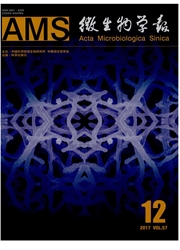

 中文摘要:
中文摘要:
【目的】从番木瓜果皮内筛选具有较强拮抗活性的内生细菌防治番木瓜采后炭疽病和疫霉病,以减少果实采后病害带来的损失。【方法】采用稀释分离和平板抑菌圈法进行内生细菌的分离筛选,结合形态特征、生理生化特性及16S rDNA部分序列同源性分析对菌株进行鉴定,菌株经利福平诱抗处理后田间接种到果树树干上,测定内生菌的定殖动态,采用采前和采后生防试验测定菌株对番木瓜炭疽病和疫霉病的生防效果。【结果】从番木瓜果皮中分离筛选到一株具有拮抗活性的内生细菌MGP3,对10种病原菌有较强的拮抗作用,鉴定该细菌为铜绿假单胞菌(Pseudomonas aeruginosa,登录号JF708186),MGP3可进入番木瓜叶片、叶柄和果皮中定殖。MGP3对采后番木瓜炭疽病和疫霉病的防治效果分别达到50%和71%;除苗期外,采前4个不同时期经MGP3菌液处理可以显著降低采收后果实炭疽菌的潜伏侵染率和炭疽病的病情指数。【结论】番木瓜内生拮抗细菌MGP3具有潜在的生防应用价值。
 英文摘要:
英文摘要:
[Objective]Postharvest decay resulted from anthracnose caused by pathogens Colletotrichum gloeosporioides and blight diseases caused by Phytophthora nicotianae leads to significant loss of papaya fruits.In order to reduce such loss,we isolated endophytic bacteria that may possess powerful antagonistic activities toward these pathogens for effective biological control of anthracnose and blight diseases.[Methods] The methods of dilution and inhibition circle were used for isolating and screening endophytic bacteria from papaya fruit.Based on morphological,physiological and biochemical characteristics,and homology analysis of the partial sequence of 16S rDNA,an endophytic bacterium was identified.The colonization of the antagonistic endophyte in papaya was detected by inoculating suspension of strains in caudices of papaya plant after Rifampicin-resistant mutants(rifr) induction.The effects on diseases caused by Colletotrichum gloeosporioides and Phytophthora nicotianae were tested by preharvest and postharvest experiments.[Results] One of the endophytic bacteria named MGP3 was selected from the papaya pericarp and identified as Pseudomonas aeruginosa(Accession No.JF708186).This bacterium was able to colonize in the laminae,leafstalk or pericarp of papaya,and strongly inhibit 10 phytopathogens.In the postharvest experiment,MGP3 inhibited 50% anthracnose and 71% blight of harvested papaya fruits.The application of MGP3 at five preharvest stages of papaya significantly reduced latent infection rate of Colletotrichum gloeosporioides and disease index of anthracnose.[Conclusion] Antagonistic endophytic bacterium MGP3 isolated from papaya fruit had potential application value as a biological control agent.
 同期刊论文项目
同期刊论文项目
 同项目期刊论文
同项目期刊论文
 Identification of (()-epicatechin as the direct substrate for polyphenol oxidase from longan fruit p
Identification of (()-epicatechin as the direct substrate for polyphenol oxidase from longan fruit p Crucial roles of membrane stability and its related proteins in the tolerance of
peach fruit to chil
Crucial roles of membrane stability and its related proteins in the tolerance of
peach fruit to chil Responses of reactive oxygen metabolism and quality in mango fruit to exogenous oxalic acid or salic
Responses of reactive oxygen metabolism and quality in mango fruit to exogenous oxalic acid or salic Effect of ATP on changes of fatty acids in harvested litchi fruit infected by Peronophythora litchii
Effect of ATP on changes of fatty acids in harvested litchi fruit infected by Peronophythora litchii A comparative identification of Ochratoxin A in longan fruit pulp by high-performance liquid chromat
A comparative identification of Ochratoxin A in longan fruit pulp by high-performance liquid chromat Peach fruit acquired
tolerance to low temperature stress by accumulation of linolenic acid and N-acy
Peach fruit acquired
tolerance to low temperature stress by accumulation of linolenic acid and N-acy Differential expression of Expansin and XET genes associated with aril breakdown in harvested longan
Differential expression of Expansin and XET genes associated with aril breakdown in harvested longan Purification and characterization of anthocyanin degradation enzyme from litchi anthocyanin degradat
Purification and characterization of anthocyanin degradation enzyme from litchi anthocyanin degradat Effects of cold storage duration on subsequent quality, energy and membrane permeability and lipid d
Effects of cold storage duration on subsequent quality, energy and membrane permeability and lipid d Antioxidant activities and contents of polyphenoloxidase substrates from pericarp tissue of litchi f
Antioxidant activities and contents of polyphenoloxidase substrates from pericarp tissue of litchi f Isolation and characterization of three ethylene perception elements and their expressions during lo
Isolation and characterization of three ethylene perception elements and their expressions during lo 期刊信息
期刊信息
